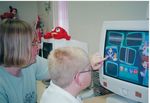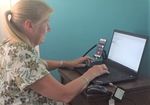MARCH IS WOMEN'S HISTORY MONTH - Lighthouse for the ...
←
→
Page content transcription
If your browser does not render page correctly, please read the page content below
Volume 21 - March, 2021
MARCH IS WOMEN'S HISTORY MONTH
March is Women's History Month – commemorating and encouraging the study,
observance and celebration of the vital role of women in American history.
The role of women in the blind community and Lighthouse for the Blind also deserves
celebration. We need first and foremost to recognize, Helen Keller as the first American
woman who led the way for all blind. Ms. Keller was an American educator who overcame
the adversity of being blind and deaf to become one of the 20th century's leading
humanitarians, as well as co-founder of the ACLU. In fact, it was Ms. Keller’s visit to
Florida in 1942 that helped lay the ground-work for state funding for the blind, which was
essential in the founding of numerous blind agencies in Florida including Lighthouse for
the Blind of the Palm Beaches.
Lighthouse’s first executive director was also a woman, Grace Emerson. Ms. Emerson
served as the founding executive director from 1946 to 1949. Throughout the Lighthouse’s
75 year history numerous women have played a role in the agencies success, including
numerous board members, donors, staff, volunteers and teachers. Today, a woman once
again takes the leadership role after 35 years of working at the lighthouse. Mary Allen
started her journey in 1986, as a Social Worker. She rose through the organization as a
Program Coordinator, Vision Services Director and now the Interim Executive Director.
The world celebrates Women's History Month to remind ourselves of the accomplishments
of women throughout the years and Lighthouse for the Blind is proud to celebrate the
women in our organization’s 75 year history as well.Helen Keller Founders at the 1946 groundbreaking.
In collaboration with
several local agencies
serving the blind and
visually impaired,
many Lighthouse
clients and staff were
vaccinated on March
11 at the new
Lighthouse location.
Judy Bice was the
first in line to receive
her shot.
COVID - ONE YEAR LATER
March 20, 2020, the day Lighthouse for the
Blind closed its doors due to the pandemic.
As everyone in America saw the spread of the
virus, the economic fall-out and the rising death
toll, staff at Lighthouse were no exception.
Many took time off, quarantined and waited.
Many asked daily, will be furloughed? When
will we be able to come back to work? How will
all of this affect us? More importantly, how
does this affect our clients?
Within days, those questions were answered.Not one employee was furloughed. Not one employee got sick. Though assistive
technology training was already being taught remotely for many clients, other instructional
areas provided primarily in-person training. Daily living skills teachers, youth services,
counseling and case management staff immediately began adapting to the new
environment. Individual sessions were first taught via Facetime and personal phone calls.
And then came ZOOM. ZOOM changed everything, and enabled clients to be brought
together for group classes and their usual monthly social gatherings; Youth Program
Activities, Boot-Up Club and Book Club.
Daily Living Skills staff reported that changing to remote classes happened so suddenly,
that they realized they had to teach things differently. They added a second camera to
demonstrate the tasks that they were teaching "close up” such as labeling methods,
kitchen safety, and other independent living skills. They created and comprehensive 11-
week curriculum to cover all skill areas which. They shared instructional videos, invited
guest speakers, showed pictures and provided descriptions of useful aids and appliances.
They also demonstrated many smart phone applications in lessons for color/money
identification, optical character readers, talking books, bar code readers, ordering
groceries and food delivery.
For many months, the teaching staff questioned, does remote learning work and were the
adaptations they made successful? As they continued to teach and began getting positive
feedback they realized that the clients were gaining new skills and were enjoying meeting
one another on-line. Clients were learning to be more independent and they were
becoming more knowledgeable as a result of the staff adapting to a new way of teaching!
But all in all, through all the changes and adjustments, staff wonders how this will affect
teaching methods in the future? Guess that remains to be seen.
A Look Back.......
An ongoing pictorial flashback from 75 years of service.
Youth Programs through the years.
1979 1990's
1950's The pre-school program Teaching visually impaired
Sunshine Kindergarten for youth changed drastically in
becomes a full-time, year-
blind and visually impaired the 1990's with the invention
round service, one of the
children opened. of computers and
first in Florida.
technology products.
Calendar of Events:
Friday, March 19 12 pm to 1pm - Virtual Book Club
e-mail dsalina@lhpb.org to register. The book is No End in Sight: my life as a
blind Iditarod racer by Rachael Scdoris.
Thursday, March 25 from 1:30 to 2:30 - Virtual Book Club
e-mail dsalina@lhpb.org to register. The book is Daddy’s Girl by Lisa
Scottoline.Saturday, March 27 - Spring Fling Celebration - Lighthouse youth
participants are invited to join us for a fun-filled afternoon of games, crafts, an
egg hunt and lunch! RSVP REQUIRED to estevens@lhpb.org.
DONATE NOW
You can also read
























































